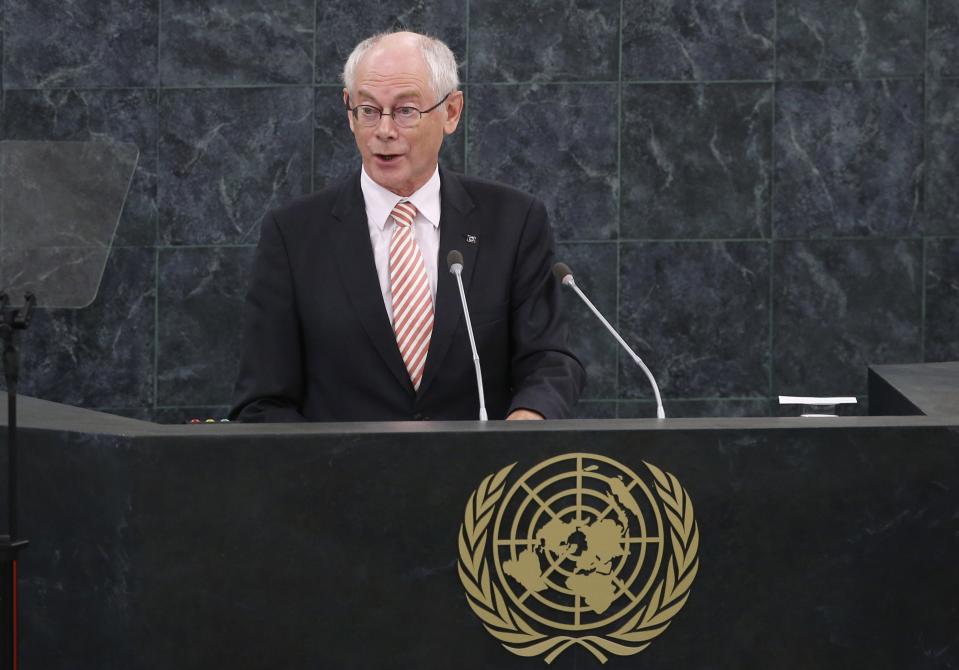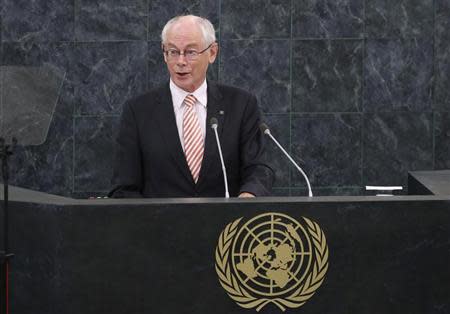Insight: Europe's bold vision hits trouble
By Luke Baker and Paul Carrel BRUSSELS/FRANKFURT (Reuters) - Barely a year after European leaders set out an ambitious vision for the euro zone's future, progress has all but stalled and pressure is building for what may amount to a 'make or break' moment for the union. The idea of a roadmap setting out steps towards the deeper integration of the euro zone came about in early 2012, when the debt crisis was at its peak and there were legitimate fears that Greece could be forced out of the currency union, or that the whole European project could disintegrate. With the global economic debate dominated by the United States and, increasingly, China, the European Union risks losing its influence unless it can speak with one voice. Herman Van Rompuy, the president of the European Council, which brings together the EU's member states, was asked by leaders to draft a report detailing what was required to strengthen the single currency and overhaul the monetary union. The plan involved working with three other top crisis-fighting figures - European Central Bank President Mario Draghi, European Commission President Jose Manuel Barroso and then president of euro zone finance ministers, Jean-Claude Juncker - on a document to be presented to leaders in June 2012. The focus was on four 'building blocks' that would complete monetary union: a "banking union" to strengthen the banking sector, a "fiscal union" to improve coordination of budget-related policy, an "economic union" to further integration and finally a "political union" to make the project more democratic. Van Rompuy presented a preliminary report, grandly titled "Towards a Genuine Economic and Monetary Union," to European leaders in June and they gave him the go-ahead to develop the ideas further, which took up much of the rest of 2012. EU leaders' largely unequivocal backing for the plan gave Draghi the cover he felt he needed to deliver his pivotal pledge just a month later that the ECB was ready to do "whatever it takes" to save the euro. A couple of months after that he reiterated that it was up to EU leaders to define where they wanted to get to and that the ECB would only act as a temporary bridge to help get there. Fast-forward to the present day and the ECB is still holding the fort. It's as-yet unused OMT bond-buying plan has deterred speculative attacks on the currency bloc, but the vision of a more integrated euro zone is almost entirely unfulfilled. "That vision has hit the natural barriers of the existing governance structure," said Andrew Bosomworth, a senior portfolio manager at Pimco, the world's largest bond fund. "We're in a holding pattern, where it's really the ECB that's doing the holding." MEETING OF MINDS While the relative recent calm in markets - with euro zone bond yields lower and the euro stable - has removed a lot of the pressure on governments to push ahead, the long-term goals have not been forgotten by Draghi. In a speech to students at Harvard last week, he talked about Europe's pursuit of "a more perfect union," and emphasized how the political will of Europe's leaders had helped hold the euro zone together, against the expectations of some U.S. hedge funds, which bet the region would shatter and lost money. "They had underestimated the depth of Europeans' commitment to the euro," Draghi said, adding that a "pragmatic focus on policy efficacy" should be the driving force for further integration. In that respect, Draghi's views marry closely with Van Rompuy's. The relationship between the two, forged in the months after Draghi took over the ECB in November 2011, is deep. Both have an iron grasp of economics and understood instinctively what was needed to reassure financial markets about the euro's future. "You have to remember, they are both Jesuits by education," an adviser to Van Rompuy said. Among the principles Jesuits advocate is a pragmatic approach to problem-solving and a willingness to learn from experience. One of Van Rompuy's favorite phrases is John Maynard Keynes's dictum: "When the facts change, I change my mind. What do you do?" That mental flexibility and willingness to adapt to changing circumstances may have helped weather the worst moments of the debt crisis, when sticking rigidly to a single pre-set path may have proved disastrous. Yet now the worst of the debt crisis appears to be over, it is exactly the issue of getting EU leaders to stick to the path that has been laid out that is proving the problem. Banking union was the first priority in the four presidents' "roadmap". While that step has been endorsed by heads of state - and slow but steady progress is being made towards it - there is virtually no mention any longer of the steps that were supposed to come after: fiscal, economic and political union. Even the timetable envisaged for banking union has slipped and its scope is being gradually scaled back. The complacency that Barroso, Van Rompuy and others have repeatedly warned of appears to have taken root. Some see that as unsurprising given that the pressure is no longer on in the same way that it was during 2011 and 2012. "It was extremely important that they laid out their vision because it created a sense that they were ready to make progress," said Janis Emmanouilidis, a senior analyst at the European Policy Centre, a Brussels think tank. "But many people would say banking union is enough to handle the situation for now. As for the steps that come after, I don't see the momentum towards that right now." GAME CHANGER That foot-dragging means the ECB is effectively alone in holding the euro together. That is a cause of frustration among ECB policymakers, who are concerned about uncompetitiveness and indebtedness in big euro zone countries like France and Italy. They are particularly worried that France is trading on the credibility of Germany, as the tight Paris-Berlin axis binds the two economies together. Only a determined commitment to structural reforms - and the kind of deep fiscal and economic coordination once envisioned in the "roadmap" - will help close the book on the crisis and prevent similar problems emerging in the future. But what to do? The ECB's protection of euro member states has eased the impulse to put their own houses in order. If the central bank removed that umbrella to focus minds in governments, market pressure could return in a flash and plunge the bloc back into crisis. The ECB shows no sign of taking such drastic action. But officials see a moment arriving soon when the ECB will put pressure on member states. That moment is the review of bank assets that the ECB will undertake next year as the new single supervisor of the euro zone banking system. The Asset Quality Review is expected to be a rigorous exercise in contrast to previous stress tests. To an extent, the ECB's reputation is on the line. A tough review will show it means business. If the review lays bare big holes in certain banks, the pressure will be on the home countries to press ahead not only with banking union, but with fiscal steps that will allow them to coordinate budget policy more effectively. "Draghi and Merkel are in a staring match," said an EU official, describing a situation in which the ECB president wants member states to act while German Chancellor Angela Merkel, as the most powerful leader, proceeds with characteristic caution. "If the ECB decides to be really tough in the asset quality review, it's going to be a wake-up call delivered by the ECB to the member states." For Draghi, an independent central banker, it is a challenge since he cannot be seen to veer too readily into territory reserved for political leaders. Monetary policy is his game. And for Van Rompuy it is complicated by the fact that his mandate as European Council president ends in a year's time. The original roadmap was expected to take up to 10 years to complete, but if Van Rompuy's successor does not buy into it, it could meet a very immediate roadblock. The report the four presidents' drafted is close to Draghi's heart, aides say. A stable monetary policy requires a stable fiscal policy and broader economic unity, they argue. Ultimately, countries must decide if they are ready to sacrifice some sovereignty on the altar of the European project for the long-term vision to move steadily into focus. Crunch time may be approaching in the form of a European Convention, which could allow euro zone leaders to make the leap forward to a more integrated bloc - or to acknowledge they have gone as far as they want to. European elections next May will set the tone for the next phase of the debate on Europe's future. The European Convention, possibly in the spring of 2015, could allow for changes to the EU treaty to open the way for more profound integration. "The question then will be: are they just going to tinker around with the Treaty, or are we going to get a truly meaningful change to it that will allow for the realization of the four presidents' report?" asked Pimco's Bosomworth. "History shows no other monetary union of that genre endured, they either fell apart of evolved into a political and fiscal union," he said. (editing by Mike Peacock and Janet McBride)



